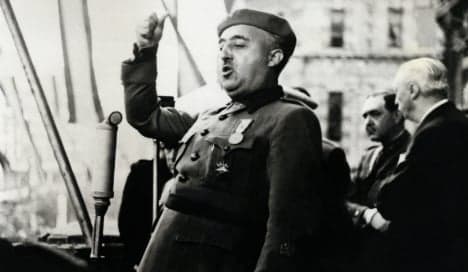Spain 'obstructing' civil war and dictatorship probe

Amnesty International on Wednesday accused the Spanish authorities of systematically obstructing probes into crimes committed during the 1936-9 civil war and Francisco Franco's subsequent dictatorship.
Spain has yet to come to terms with this dark, recent past, which remains suppressed to this day for fear of reviving once-bloody divisions, despite growing calls to heal wounds.
"Spain's problem is not the act of forgetting, it is obstruction so that the crimes committed during the civil war and Franco regime are never subject to probes, neither in or outside the country," said Amnesty Spain chief Esteban Beltran.
Just over 40 years after the death of Franco, he told reporters that courts refuse to probe victims' complaints and allegations of torture, forced disappearances and extra-judicial killings.
Sitting next to him, Antonio Narvaez, 83, said he was still searching for his father's body after he was killed in 1936, and also that of his mother, who was arrested and went missing that same year.
Maria Servini, an Argentine judge, has opened a lawsuit to investigate rights violations during the war and dictatorship after alleged victims filed a complaint in her country.
In 2014, she issued arrest and extradition warrants for 19 former Spanish officials, including ex-ministers of Franco, to face justice in Argentina for alleged crimes against humanity - but Madrid rejected them.
In an internal memo from September 30th seen by AFP, Spain's then attorney general explained why Madrid should not collaborate with judicial authorities in Argentina.
"Even in the very improbable case that an official who is still alive and able to stand trial were identified, Spanish authorities could not authorise an extradition, as these are incidents that come under the remit of Spanish courts," wrote Consuelo Madrigal.
She added that past incidents could not be prosecuted as they were too old and had been tacitly pardoned under an amnesty law approved in 1977 after Franco's death, as leaders tried to prevent score-settling, unite the country and steer it toward democracy.
But Ignacio Jovtis, an Amnesty researcher, said "these arguments go completely against international law."
According to Amnesty, the UN Human Rights Committee says amnesties that prevent those who committed rights violations from standing trial are incompatible with a country's duty to investigate serious crimes.
Comments
See Also
Spain has yet to come to terms with this dark, recent past, which remains suppressed to this day for fear of reviving once-bloody divisions, despite growing calls to heal wounds.
"Spain's problem is not the act of forgetting, it is obstruction so that the crimes committed during the civil war and Franco regime are never subject to probes, neither in or outside the country," said Amnesty Spain chief Esteban Beltran.
Just over 40 years after the death of Franco, he told reporters that courts refuse to probe victims' complaints and allegations of torture, forced disappearances and extra-judicial killings.
Sitting next to him, Antonio Narvaez, 83, said he was still searching for his father's body after he was killed in 1936, and also that of his mother, who was arrested and went missing that same year.
Maria Servini, an Argentine judge, has opened a lawsuit to investigate rights violations during the war and dictatorship after alleged victims filed a complaint in her country.
In 2014, she issued arrest and extradition warrants for 19 former Spanish officials, including ex-ministers of Franco, to face justice in Argentina for alleged crimes against humanity - but Madrid rejected them.
In an internal memo from September 30th seen by AFP, Spain's then attorney general explained why Madrid should not collaborate with judicial authorities in Argentina.
"Even in the very improbable case that an official who is still alive and able to stand trial were identified, Spanish authorities could not authorise an extradition, as these are incidents that come under the remit of Spanish courts," wrote Consuelo Madrigal.
She added that past incidents could not be prosecuted as they were too old and had been tacitly pardoned under an amnesty law approved in 1977 after Franco's death, as leaders tried to prevent score-settling, unite the country and steer it toward democracy.
But Ignacio Jovtis, an Amnesty researcher, said "these arguments go completely against international law."
According to Amnesty, the UN Human Rights Committee says amnesties that prevent those who committed rights violations from standing trial are incompatible with a country's duty to investigate serious crimes.
Join the conversation in our comments section below. Share your own views and experience and if you have a question or suggestion for our journalists then email us at [email protected].
Please keep comments civil, constructive and on topic – and make sure to read our terms of use before getting involved.
Please log in here to leave a comment.